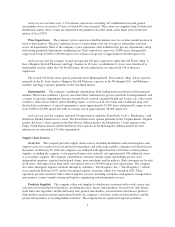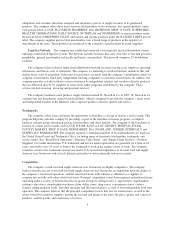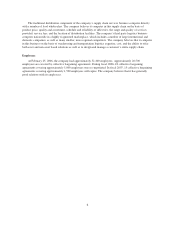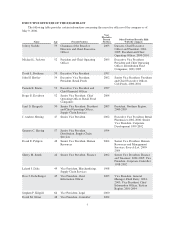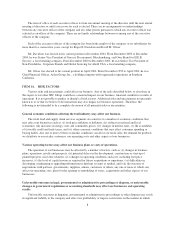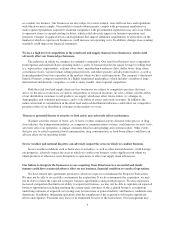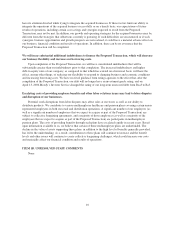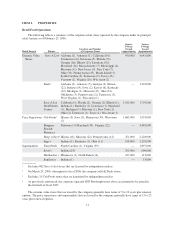Albertsons 2006 Annual Report Download - page 14
Download and view the complete annual report
Please find page 14 of the 2006 Albertsons annual report below. You can navigate through the pages in the report by either clicking on the pages listed below, or by using the keyword search tool below to find specific information within the annual report.supermarkets. Our supply chain services operations network spans 48 states and we serve as primary grocery
supplier to approximately 2,200 stores, in addition to our own regional banner store network, as well as serving
as secondary grocery supplier to approximately 500 stores. Based on revenues for fiscal 2006, we would be
ranked as the largest extreme value food retailer, ninth largest grocery retailer, and largest public company food
wholesaler in the United States.
On January 23, 2006, SUPERVALU announced that SUPERVALU, CVS Corporation (“CVS”) and an
investment group led by Cerberus Capital Management, L.P. (the “Cerberus Group”) had reached definitive
agreements to acquire Albertson’s, Inc (“Albertsons”). Each Albertsons stockholder will ultimately be entitled to
receive $20.35 in cash and 0.182 shares of SUPERVALU common stock for each share of Albertsons’ common
stock that they held before the transaction. Pursuant to those agreements, SUPERVALU will acquire the
operations of Acme Markets, Bristol Farms, Jewel-Osco, Shaw’s Supermarkets, Star Markets, and the
Albertsons’ banner stores in the Intermountain, Northwest and Southern California regions, and the related
in-store pharmacies under the Osco and Save-On banners, for a total of approximately 1,125 stores (the
“Proposed Transaction”). The total consideration to be paid by SUPERVALU is approximately $12.4 billion
(based on a $32.65 average stock price using the 20 day trading average of the closing price of SUPERVALU
stock through January 20, 2006) including approximately $3.8 billion in cash and $2.5 billion in stock and the
assumption of approximately $6.1 billion of Albertsons’ debt. Following the Proposed Transaction, which is
expected to close during June 2006, approximately 65 percent of SUPERVALU will be held by existing
SUPERVALU stockholders and approximately 35 percent will be held by former Albertsons’ stockholders, on a
fully diluted basis, including the early settlement of the Albertsons’ 7.25 percent mandatory convertible
securities. The “new” SUPERVALU will have approximately 224 million fully diluted common shares
outstanding, compared to approximately 146 million fully diluted shares outstanding as of February 25, 2006.
After the Proposed Transaction, SUPERVALU is expected to have revenues of approximately $44 billion (of
which approximately 80% will be retail), approximately 194,000 employees, 2,505 owned and licensed stores,
878 in-store pharmacies and 117 fuel centers. The transaction is subject to approval by SUPERVALU
stockholders and Albertsons’ stockholders, the contemporaneous closing of the agreements with the Cerberus
Group and CVS, and the satisfaction or waiver of customary closing conditions. On April 28, 2006, the Securities
and Exchange Commission (“SEC”) declared effective the Form S-4 Joint Proxy Statement / Prospectus in
connection with the Proposed Transaction.
The grocery food industry can be characterized as one of consolidation and rationalization, as evidenced by
the Proposed Transaction. The industry also continues to experience store saturation driven primarily by
increases in square footage devoted to food in supercenters, club stores, mass merchandisers, dollar stores, drug
stores and other alternate formats as well as organic growth by traditional supermarket operators. This
competition continues to pressure same store sales.
The grocery industry is also affected by the general economic environment and its impact on consumer
spending behavior. We would characterize fiscal 2006 as a year with modest economic growth, high fuel price
inflation and slightly increased product cost inflation. For fiscal 2007, we expect consumer spending will again
be pressured by higher fuel prices and modest food inflation.
In fiscal 2006, most businesses, including the labor intensive grocery industry, were impacted by another
year of rising health care and pension costs. Although the rate of increase moderated in fiscal 2006, these rising
costs impacted the overall profitability levels of the food industry and remain a pivotal issue in labor negotiations
for unionized employees who bargain for health and retirement benefits in addition to wages. Approximately 39
percent of SUPERVALU’s employees are unionized. We did not experience any strikes during fiscal 2006.
Approximately 7 percent of our unionized workforce is represented by contracts that are up for renewal in fiscal
2007. Assuming the closing of the Proposed Transaction, approximately 62 percent of our employees will be
unionized and approximately 25 percent of our unionized workforce will be represented by contracts that are up
for renewal in fiscal 2007.
14


